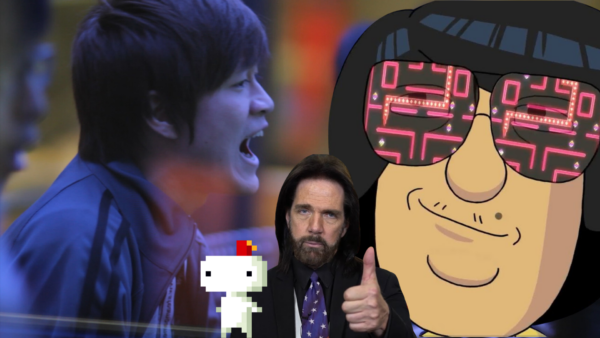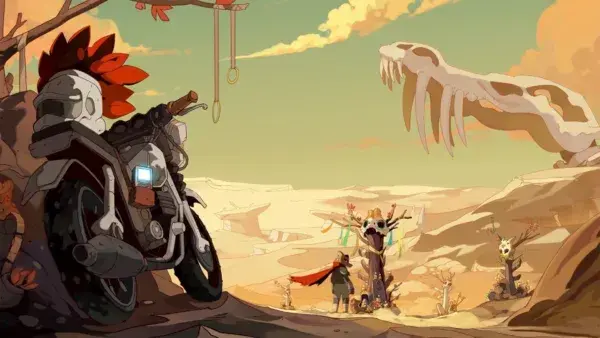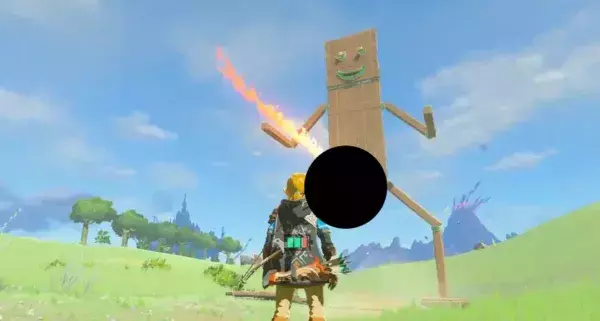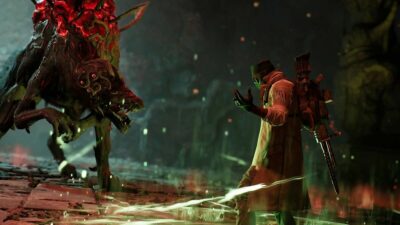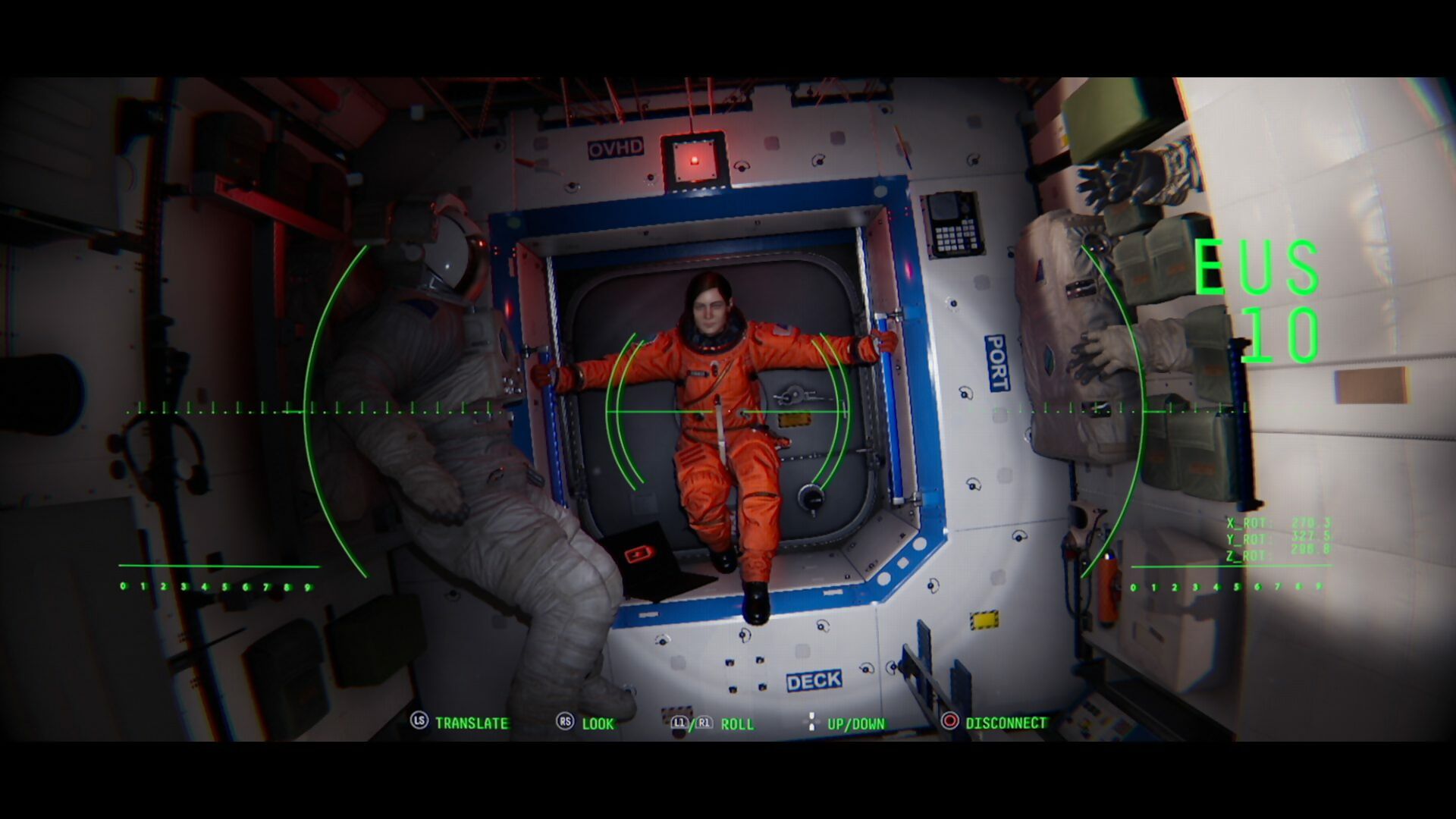
Writer-director Jon McKellan tells the fascinating story of his path into the games industry, and how Alien: Isolation led to co-founding his own indie studio.
This article was originally going to be about suspense. About how writer-director Jon McKellan, first at The Creative Assembly and later at the studio he co-founded, No Code, has worked on some of the most tense, downright scary games of the past decade. First, there was Alien: Isolation, a survival horror title that seemed to come out of nowhere in 2014; establishing a battle of wits between the player and a computer-controlled creature that could pop up and kill them at almost any moment, Isolation was intelligently and elegantly crafted as few licensed games are. Then came No Code’s 2017 debut, Stories Untold – an anthology of quietly terrifying short tales that felt like a quartet of contemporary adventures written by Edgar Allan Poe. Next came 2019’s Observation, an absorbing sci-fi adventure that, while not exactly horror, was intense and uneasy, all building to an uncanny, mind-expanding conclusion that really crawled under the skin.
Beyond the suspense, though, there’s another, more interesting story about McKellan’s path into the industry – a journey that took him from a childhood playing pirated computer games on a Glasgow council estate to becoming one of the most interesting storytellers currently working in the British games industry. For people from working-class or under-represented backgrounds, getting into any creative industry is a risk; without a financial safety net, career moves like internships or low-paid, entry-level jobs simply aren’t viable. And that’s assuming you even realise these jobs are out there in the first place; as McKellan recalls of growing up in the eighties and nineties, his school “didn’t understand the creative industries [or] anything beyond factories and call centres”.

“My mum was very ill and my dad had to look after her full-time, so we didn’t have much money,” McKellan tells us. “We were on benefits. We couldn’t afford things – like, we couldn’t afford electricity half the time. It was a pretty grim upbringing at certain points – we had good times, but there were also bad points. And you had to pirate games; it was the only way to play something if you had no money.“
With little to spend on the latest computers, McKellan was often at least one hardware generation behind many of his peers. Still, he recalls sitting with his father, typing in code listings from magazines, and later, designing mods for Quake. But again, there were no signs anywhere that making games was a viable career move. “I was making DOOM mods when I was twelve, and getting really passionate about it, but then you talk to a teacher and they’re just [dismissive]. There were no university degrees back then that were useful to get into games. And growing up in the east end of Glasgow, I didn’t even know there was a games industry in the UK. It wasn’t a job as far as anyone was concerned.”
As a result, McKellan left school and wound up working at a call centre for five years, then went to university to study graphic design. It was from there that he managed to get a job as a motion graphics artist at DMA Design in Dundee, where he landed his first game credit: 2010’s APB: All Points Bulletin. He was 28.
“That was my first kind of break, but as a result, I lost maybe ten years of potential career time because there wasn’t enough awareness of what was possible. Coming from a working-class background, there was no money to support me. I couldn’t say, ‘OK, I’ll go down to Cambridge to study programming’. I fell into it quite late.”

McKellan points to a video that journalist Sam Greer and YouTube channel People Make Games had uploaded the day before Wireframe caught up with him back in August. “That talks about the working class trying to enter the games industry. It’s definitely a middle-class-dominated industry, in the UK at least.”
McKellan’s talent as a designer saw him land a job at The Creative Assembly, where he began working on Alien: Isolation’s retro-futuristic interfaces – all chunky fonts and mechanical keyboards. Recreating the original Alien movie’s 1970s vision of the 22nd century seemed to unlock something in McKellan’s brain, because while the game was still in the earliest stages of development, he began throwing out ideas that helped shape Alien: Isolation’s creative direction: far from background flavour, the old computer interfaces began to form one of its gameplay pillars. “As time went on, and being quite integrated into the design team, I began pitching features like the rewiring system and minigames – ‘I’ve got this idea and I can make it feel cool’. It became more integral as time went on.”
The Creative Assembly’s experimental approach to Alien: Isolation’s design meant that the team never quite knew whether the resulting game would succeed, though McKellan recalls the moment when they first got an inkling that they were on the right track.
“I don’t think many people truly understood what we’d made until the first press playtest,” he recalls. “We got something like 50-odd press from around Europe and the UK to come and play an hour of the game, which no one was expecting. They were all coming out just wide-eyed and, like, ‘Holy shit’. Coming from a strategy studio, people were just shocked by what they saw.”

Development on Alien: Isolation lasted a gruelling five years – today, McKellan still calls it “the hardest thing I’ve worked on”. But he also grew in confidence as the production wound on, until towards the end he was working as the creative lead on the superb Crew Expendable DLC, which recreates the 1979’s film’s plot, right down to its original cast of characters.
Finally released to critical acclaim in 2014, Alien: Isolation served as the ideal calling card for McKellan, who subsequently worked on Red Dead Redemption 2 at Edinburgh’s Rockstar North. Despite the security of a job in triple-A development, however, McKellan began to feel a little lost in the studio’s sprawl: “I was only there for nine months, a year, something like that. Because as soon as I got there, I realised I’d made the wrong decision.”
Read more: Alien | Why the xenomorph is so irresistible to games, and so hard to get right
Working on Alien: Isolation’s DLC had given him a taste of what it was like to lead a creative team, try out ideas, and influence the path of a game’s design. At Rockstar North, he was back on UI design in the midst of a team numbered in the hundreds. Feeling restless, McKellan got in touch with a childhood friend, Omar Khan; they’d collaborated on all kinds of things in the past, including music for adverts and the odd game jam. What if they formed a development studio? Neither had much programming experience – Khan came from a background in audio and music production – so the pair jokingly called the company No Code. “Starting a studio with no savings isn’t a sensible idea when you have three children,” McKellan admits. “I didn’t have a safety net.”

McKellan already had an idea for a game – one that seemed like a logical progression from Alien: Isolation. Set aboard a space station, it cast the player as the craft’s artificially intelligent computer, tasked with protecting its lone human survivor as various life-support systems fail left and right. McKellan described the game as “2001: A Space Odyssey, but you’re playing as HAL”.
“It’s called Observation,” McKellan recalls telling Khan. “I want to make it. I don’t know how we’re going to do it, but we should.”
To get the studio going, much less build a working prototype, No Code urgently needed cash. McKellan had few contacts with publishers at this point, though he was still in touch with his old DMA boss, David Jones. “I’d done a lot of good work for Dave and really put a lot of effort in, and he recognised that. So when I came to him and said, ‘I need to start a studio, I need advice’, he was like, ‘How much money do you need?’ and gave us a little bit of cash to do some work for his company as a side hustle while we developed a prototype. So he basically invested in the company right away. But it was super-risky. Really risky. And I was leaving the biggest job in Scotland.”
As Observation’s initial prototype was being built, the fledgling studio, founded in March 2015, kept itself going by making a mobile game, Super Arc Light, while McKellan raised funds by doing UI contract work on Crackdown 3. In the midst of all this, McKellan and Khan entered the Ludum Dare 36 game jam. The theme was ‘ancient technology’. “I was talking to my kid, saying, ‘What do we do for ancient technology?’, and he said, ‘Those old games you used to play. Those are ancient’. That turned out to be a great idea.”

Such was the seed that led to The House Abandon, a horror short that cleverly repurposes and reframes that most archaic of genres: the text adventure. You’re seated in front of an old 8-bit computer, typing commands into the parser using its rattly keyboard. But as you play the adventure on the screen – essentially, a game within a game – it begins having increasingly unsettling effects on the ‘real’ world surrounding you. The House Abandon established a limitation that was later used to similarly suspenseful effect in Observation – your view is restricted to the computer in front of you, and as the game goes on, there are noises and events that unfold over your shoulder or outside the room.
“It allowed us to road-test some ideas that we had lying around,” McKellan says. “Locking the camera’s perspective was a really conscious thing in Stories Untold. We were forcing you to engage with the horrors in front of you. Not jump scares, but uncomfortable situations. By not letting you turn your head and see the rest of the room, it made you wonder if there could be someone there [behind you]. You don’t really understand the context of the place you’re in, and that really adds uncertainty to the minute-to-minute experience. You’re hearing a noise in the background and you want to be able to turn around, but it’s not letting you – that’s a very powerful thing. In Observation, it’s planting that seed in the player’s mind: what’s out of shot? What can’t I see, and why aren’t you letting me see it?”
The House Abandon became something of a viral hit when it appeared online in 2016, leading McKellan and his small team to make it into Stories Untold, a small anthology of four games with similar themes, released the following year. The game jam prototype was polished up as the first episode, while the instalments that came after it, The Lab Conduct, The Station Process, and The Last Session, expanded on its ideas and established subtle commonalities between all four entries. Says McKellan: “The idea for an anthology was born almost immediately. In my naivety, I said, ‘We’ll be done in a couple of weeks!’, but then it ended up taking six months. It was crazy.”

In the meantime, Observation had found a publisher, Devolver Digital, which meant the game could finally go into full production. Despite the core team only amounting to eleven members at its peak, No Code managed to make a sci-fi game with visuals that approached those with a budget many times its size. Indeed, just how good the resulting game looks still comes as a surprise to McKellan himself.
“It was largely myself, Alanna [Butchart], and Lee [McKellan], my wife, who were doing all the artwork. A lot of us were learning that stuff for the first time. And we were getting help from some veterans who’d worked at Creative Assembly or previous companies, where we’d get them in to help us do stuff that was way too complicated for us to do on our own. But the lion’s share of the game was made by a really small team.”
Released in 2019, Observation was rightly praised for its absorbing plot and tense atmosphere; perhaps its biggest coup, though, was winning Best British Game at that year’s BAFTAs. Among its competitors? Inkle’s indie darling, Heaven’s Vault, and Total War: Three Kingdoms, developed by McKellan’s old stomping ground, The Creative Assembly.
That BAFTA win has only helped open more doors for McKellan and his studio, but some of the stresses of running an independent studio still remain – not to mention the feeling of self-doubt that often gnaws away at those from humbler backgrounds.

“I think it comes back to the class thing,” he reasons. “People assume that once you’ve released a hit game, you’re rich and all that, which isn’t the case. We continue to put everything back into the business; our wages are very modest. That success will come eventually if we keep doing the right thing, we hope, but for now, we’ve put everything back in. We’re still running the company like it’s in our garage, for better or worse… over the past five years, I’ve learned so much about dev, tech, social networking. As someone with deep anxiety and imposter syndrome, it’s been a total challenge!”
Today, No Code has swelled its ranks to around 20 staff, and at the time of writing, it’s two years into development on an as-yet unannounced title. “We’re working on the biggest project I’ve ever worked on,” McKellan says. “Even though it’s not the biggest team I’ve worked with, it’s definitely got the most pressure behind it, because I’m leading this one; I’m writing and directing it. So it’s, ‘Here we go, this is the big one…’”
Despite the risks and stresses involved in its founding, No Code has so far found its footing in a fast-moving and competitive business. But while McKellan has successfully forged his own path through the games industry, he argues that some of the same barriers to entry for people from less privileged backgrounds still remain in 2022. “I think it’s still the same, but there’s efforts going into changing that,” he says. “There are foundations set up to help people from lower class backgrounds to get into the arts, and to broaden the range of voices contributing to film, TV, and games. I think where the problem comes up is just inherent to class: if you want to start making games on your own, sitting in your house as a teenager, you need to be able to afford a PC, or a software licence. So there are fundamental barriers to entry – which is why the software I used as a kid was all pirated. I hold my hands up to that.”
Certain schools are also still “lagging behind” when it comes to encouraging pupils to take up arts subjects, McKellan argues. “In the schools that I went to and the schools I’m familiar with, they see the arts as something you do for fun. When you’re picking your subjects, they only let you pick one creative class – music or art. Like, why aren’t you letting people do the things they love? That seems wild to me. I don’t know if that’s just state schools or not, but it’s definitely something that needs to be addressed.”
There is, though, a glimmer of hope for the future, he adds. “I’ve visited schools and universities and said, ‘You see all those names that come up at the end of films and games? Those are jobs, and you can go and do those jobs. You can make this stuff.”


